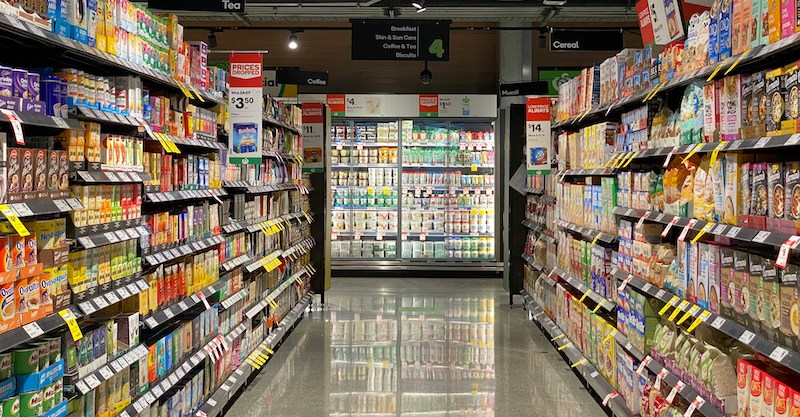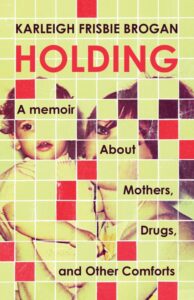
How Working at a Grocery Store Helped Me Become a Better Writer
Karleigh Frisbie Brogan Considers the Benefits and Trade-Offs of a Non-Literary Day Job
I was flipping through a rack of pants at a resale shop when I ran into Consuelo, a poet I’d met while we were doing our MFAs at Portland State. It was a bit of encouraging synchronicity, actually, as she was one of the people I held in my mind as I shopped for “writerly” outfits to take on the road during my upcoming book tour. (My closet consists mainly of Hawaiian shirts and Old Navy jeans purchased in bulk—the required attire for my job as a grocery store manager). Consuelo is not only chic and beautiful, but, as a regularly-publishing writer and a university professor, has exactly the kind of enviable literary life I want for myself.
To dedicate my life wholly to writing has always been the goal. In my imagination, I will teach eager and impassioned students by day and, come night—if I’m not in my cluttered office working on my next book—I’ll attend readings and other such cultural events.
Working in a grocery store, I don’t feel like a real writer. Whenever my writing career comes up in conversation with coworkers or customers, they say something like “how fun!” as if I’m merely a hobbyist. It goes the other direction too: at the conferences, the summer workshops of renown, many a new novelist friend seems amused, if not confused, by my employer. “How fun!” they say, naming their favorite frozen entrees. Most of these people, I believe, have some sort of respectable writing-adjacent career—be it teaching at a university, editing a lit mag, or as a regular contributor at some esteemed publication. I know no harm is meant by their enthusiasm, even when my insecure mind reads their sincere remarks as patronizing. Regardless, next to them I feel like a total fraud.
If I had one of these writerly jobs, I’d be advancing the arts, fostering diverse voices, doing important and fulfilling work. I’d gain the confidence of fellow scribers, complete strangers, my parents, myself, even. I’d be taken seriously for the very thing I take most seriously.
Am I a writer first, or a grocer? And is it possible to be fully and completely both, to be present in a dual reality?
When I saw Consuelo and asked her how she was doing, she wearily admitted that she was looking for a new job. Not because she was dissatisfied at our alma mater, but because her contract had ended. I was surprised to learn that she wasn’t actually full-time faculty and was, instead, a “visiting scholar” with a term-by-term agreement. She confessed that she was still playing catch-up—reading and leaving comments on three classrooms’ worth of final projects—two weeks after the academic year had ended. “The day doesn’t end when you leave the campus,” she said. “You’re constantly grading, planning, reading on your own time.” I wondered if she even had the time to write poetry anymore.
Brittany Ackerman, a writer I met at the Sewanee Writers’ Conference a few summers ago, shares in her Substack newsletter, Taking the Stairs: “A writer I admire says she wishes she were a plumber because that’s a job with a clear beginning and an end.” At the time of the post, Ackerman had just left her job at Vanderbilt to begin yoga teacher training in California.
My job has a clear beginning and end. More accurately (yet less literally), my job is contained and concealed, existing in a world completely separate from the one where I arrange pretty words on a screen. These worlds rarely eclipse. I think about this a lot, how my life sometimes feels like two: two careers, two temperaments (introvert/extrovert), two pursuits (am I a Kool-Aid chugging company man or a die-hard creative?)
When I punch in for my shift, I respond to ringing bells, honoring refunds for cheese gone moldy or slimy lettuce. I drag two-ton pallets of sparkling water from a loading dock into a cramped back room, hang salami from pegs, rotate tubs of hummus, and hand bouquets of flowers to bad-day-having shoppers. Most importantly, I support, develop, and have a ton of fun with 80-odd employees of varying ages and tenure, people I’ve come to think of as family.
But when I lock up the doors each night, I also lock up the part of my brain that had just endured ten physically-demanding and socially-draining hours in a place with an atmosphere not unlike a gameshow. Mysteriously, the creative part of my mind is unaffected. It’s refreshed, even. I head straight home and open my laptop, return to my writing with gusto. I’m most productive during this time, almost manic as I try to make the most of the two good hours I have before the melatonin kicks in.
And in the morning, I write too, usually from the coziness of my bed, mug of coffee on nightstand, picking up wherever I’d left off the night before. I research and outline and edit, sometimes draft entire essays, build entire worlds, all before fastening my nametag to my shirt and clipping my boxcutter to my belt. If I had one of those writer jobs I think I so desperately want, would I be able to do this? Wouldn’t I be too fatigued by words to think of any?
I assume that having to worry about such things as patching together adjuncting gigs, routinely applying to short-lived and far-flung opportunities, health insurance, etc. puts a damper on creativity. Furthermore, I don’t think I could stand pouring my entire soul into projects and lesson plans, into my students’ work and lives, into even paragraphs of technical copy if I wasn’t proportionately compensated. And I know I wouldn’t be able to do less than pour my entire soul!
Keeping my livelihood as remote and dissimilar from my passion as possible has been a favorable, if not a totally accidental, strategy. In fact, it was precisely (and ironically) my experience as grocery-store worker that occasioned my big break at a major publication. And perhaps it’s this fact keeps me insecure and conflicted. Am I a writer first, or a grocer? And is it possible to be fully and completely both, to be present in a dual reality?
In many ways, this has been the ideal situation for me. Despite the sensory overload and lower back pain, I have a stable, rewarding job that doesn’t limit my artistic output. If anything, I’ve never been more productive or inspired. But there’s the (very) old saying: “To do two things at once is to do neither.” I fear that if I continue to advance in both professions, one side will surely win out. Like a tug-of-war. Or I’ll just burn out on both ends, becoming the living proof of a 2000-year-old Latin maxim. Eventually, I might have to ask myself, where more of my heart is. For now, I’ll wear Hawaiian shirts. Forever, I’ll write.
__________________________________

Holding: A Memoir About Mothers, Drugs, and Other Comforts by Karleigh Frisbie Brogan is available from Steerforth Press.
Karleigh Frisbie Brogan
Karleigh Frisbie Brogan is a writer living in Portland, Oregon. She was a 2024 Oregon Literary Fellow and a 2022 Rona Jaffe Scholar at the Bread Loaf Writers' Conference. Her work has been published in The Atlantic, Washington Post, Vol. 1 Brooklyn, The Huffington Post, Entropy, Nailed, and forthcoming in Poets & Writers. Her debut memoir, Holding: A Memoir About Mothers, Drugs, and Other Comforts, will be released on August 26th, 2025.



















